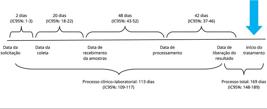This study estimated the proportion of underreporting of multidrug-resistant tuberculosis (MDR-TB) and associated factors in the State of Rio de Janeiro, Brazil, as well as the proportion of deaths in this group. A retrospective cohort study was conducted using probabilistic database linkage. Cases with the results of the drug sensitivity test (DST) with MDR-TB pattern recorded in the Laboratory Environment Management System (GAL) from 2010 to 2017 were linked to cases reported to the Special TB Treatments System (SITETB). Simple and multiple logistic regressions were performed to estimate factors associated with underreporting. Death was verified by search for cases in the Mortality Information System (SIM) and in the portal of the Rio de Janeiro State Court of Justice. Of the 651 cases of MDR-TB in the GAL, 165 had not been reported to the SITETB, meaning an underreporting rate of 25.4% in the sample. Among the unreported cases, 61 (37%) were identified in the death records. In the multiple analysis, the fact that the test was ordered by a hospital (OR = 2.86; 95%CI: 1.72-4.73) was associated with underreporting. Overall, the mean turnaround time between ordering the test and releasing the result was 113 days. Among reported cases, the mean time between ordering the test and initiating treatment was 169 days. The results underline the urgent need to strengthen epidemiological surveillance activities for MDR-TB, establish and monitor hospital surveillance centers and routine TB reporting in hospitals, review operational stages, and integrate various information systems to make them more agile and integrated.
Keywords:
Multidrug-Resistant Tuberculosis; Informations Systems; Public Health Surveillance; Epidemiological Monitoring

 Thumbnail
Thumbnail
 Thumbnail
Thumbnail
 GAL: Sistema Gerenciador de Ambiente Laboratorial; RH: rifampicina e isoniazida; SITETB: Sistema de Tratamentos Especiais de Tuberculose; TSA: teste de sensibilidade às drogas.
GAL: Sistema Gerenciador de Ambiente Laboratorial; RH: rifampicina e isoniazida; SITETB: Sistema de Tratamentos Especiais de Tuberculose; TSA: teste de sensibilidade às drogas.
 IC95: intervalo de 95% de confiança.
IC95: intervalo de 95% de confiança.